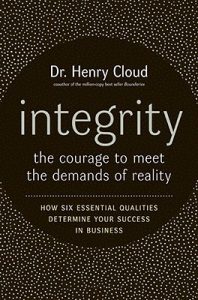We all know people of integrity. We know it when we see it, but it’s not so easy to define. In his book Integrity: The Courage to Meet the Demands of Reality, Henry Cloud brings a breadth and a depth to the subject that few could. The book is as appropriate for a CEO of a Fortune 100 Company as it is for a small group in a local church. Cloud thoughtfully examines integrity and how to develop it.
In the book, Cloud identifies six abilities that create integrity. People with integrity have the ability to:
- Connect authentically (leads to trust)
- Be oriented toward the truth (leads to finding and operating in reality)
- Get results and finish well (leads to reaching goals, profits, or the mission)
- Embrace and deal with the negative (leads to ending, resolving, or transforming problems)
- Be oriented toward growth (which leads to increase)
- Be transcendent (which leads to enlargement of the bigger picture and oneself)
Cloud helps navigate the difficult waters of personality differences as he analyzes integrity. Some leaders are not naturally people-oriented and they resort to bullying their people to accomplish tasks. Other leaders are so people-oriented that they never get anything done, but everyone loves them! Leaders today typically capitalize on their strengths while ignoring their weaknesses. Although building on your strengths is important, leaders should realize that some perceived weaknesses are often contributors to integrity.
Behaviors like follow-through (the third ability listed above) are sometimes identified as a weakness. Cloud appropriately identifies the difference between weakness and a lack of integrity. Each leader will work more on certain areas of integrity than others, but all six must be developed. If a person never follows through to complete their goals (#3), this is an issue of integrity, not simply a weakness. The same can be said of denying reality, which some would call faith (#2). You surely must have faith (#6), but if it keeps you from seeing the truth it is not integrity.
Cloud helpfully illustrates how each of these components must work in concert with each other. Integrity can only be called integrity when all six of these abilities are integrated into one whole. This cannot be done mechanistically, but rather dynamically. Most older leaders have had to learn the consequences of failing to effectively develop in the leadership role. We all know someone who has been “dethroned” because they failed to develop in one or more of the six areas outlined in the book.
This book has the potential to accelerate the development of a leader’s integrity by identifying which areas he or she lacks. The book allows for an intentional process rather than a random approach to developing integrity in our lives.
What This Book Means To Me
I find this book so refreshing because Cloud’s words challenge me, both personally and professionally. He leaves no part of my life untouched. I first read the book several years ago. I took my team through the book and we spoke into each other’s lives as we reviewed the chapters. It was one of the most humbling, yet growing experiences that I have encountered in team development.
In rereading it for this review I was reminded of the power of the principles to transform a mediocre leader into a truly impactful one simply by building integrity into their life. I was also reminded of my need to go through it again with some trusted friends. I recommend doing so for yourself and with those around you.

